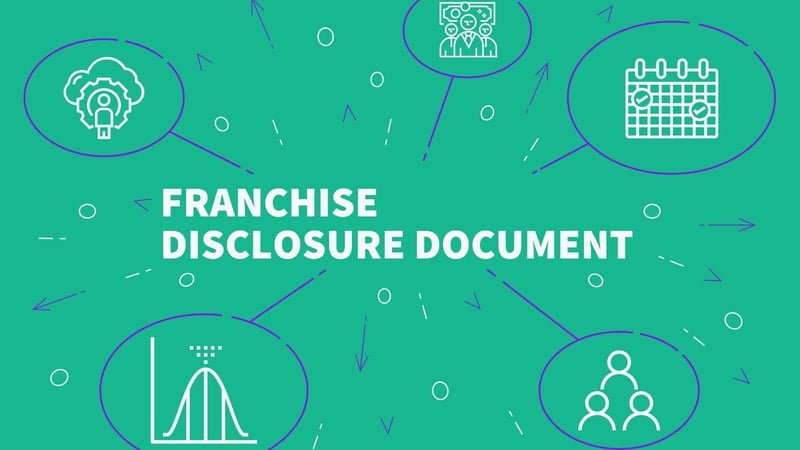What is an FDD and What Should I Look For?
Posted on: March 2, 2020 at 10:00 AM

So, you’re thinking of purchasing a low-cost franchise? If you’ve started your research and you got this far—congratulations! If you’re looking for some more general information before diving in too deep, we recommend reading about what a franchise is, what to consider before purchasing a low-cost franchise or the advantages of purchasing a franchise.
Here, we are going to focus on the franchise disclosure document—what it is and what you should look for.
Free Download: Your Ultimate Guide to Franchising
What is a Franchise Disclosure Document (FDD)?
You probably wouldn’t buy a house without getting it inspected and carefully examining the inspector’s report. Heck, you probably wouldn’t even buy a pair of shoes online without spending hours reading reviews.
So, it makes sense that you wouldn’t buy a franchise without doing your research. Before making an investment, you would want as much information as possible about the franchise, their financial history, and what the opportunity entails so you can make the most informed decision possible.
This is where the franchise disclosure document comes in.
A franchise disclosure document, also called an FDD, is a legal document that must be provided from a franchisor to a potential franchisee before purchasing a franchise in the United States. The FDD provides comprehensive information about the franchisor and the franchise opportunity including financial health, how much you can expect to earn and any fees you will be required to pay.
Think of it like a prospectus for an investment.
What Information is in an FDD?
An FDD is broken into 23 different sections known as “items.” Each item provides important information about the franchise. Let’s take a look at each item.
Item1: The franchisor and any parents, predecessors, and affiliates- This item outlines how the business was started and what transfers of ownership have taken place. It also tells you the history of the franchise organization, parent corporations and discloses any other businesses in which the franchisor may be involved.
Item 2: Business experience- A listing of all the key individuals, ranging from partners and directors to top executives with management responsibilities for the franchise. It will state the occupation and employer for each person over the past five years.
Item 3: Litigation- This section shows any lawsuits the franchisor has been involved in over the last 5 years. It’s not uncommon for large companies to be involved in a small number of lawsuits, but if you notice several franchisees complaining about the same issue, like fraud or misrepresentation, that should be a big red flag.
Item 4: Bankruptcy- If the franchisor or any of its affiliates or members of its management team have previously filed for bankruptcy, it will be disclosed here.
Item 5: Initial fees- This section will disclose any upfront fees required to be paid before opening the business. This includes the one-time initial franchise fee.
Item 6: Other fees- This section will cover other fees required for operation of the business. Other fees can include royalties, ongoing administrative fees, marketing fees, etc. Any hidden or undisclosed fees can be a source of dispute down the road, so a franchisor must be transparent.
Item 7: Estimated initial investment- Here, the franchisor will disclose the total estimated initial investment needed to establish and open a new franchise location. This is given as a range with a low and high estimate.
Item 8: Restrictions on sources of products and services- Tells you three things about procurement of products and services: 1) which ones you are required to get from the franchisor; 2) the recommended suppliers of goods not provided by the franchisor; and 3) the items that are the obligation of the franchisees to provide for themselves.
Item 9: Franchisee’s obligations- Just as the franchisor must support the franchisee, the franchisee must also follow obligations put forth by the franchisor. This section will detail those obligations such as upholding the integrity of the brand and representing the franchisor in a positive manner.
Item 10: Financing- This section is to advise the prospective franchisee what funding options are available from the franchisor to fund the business, if any.
Item 11: Franchisor’s assistance, advertising, computer systems, and training- Here, the franchisor will describe any training and assistance the franchisee will receive in opening the business, any advertising requirements, and a list of computer programs or software that will be required to run the business.
Item 12: Territory- While there is no obligation to give a franchisee any range or territory to do business, this is the space to indicate any geographical restrictions a franchisor is putting on the franchisee.
Item 13: Trademarks- All registered trademarks of the franchisor are specified in this item, including all the registration information for those trademarks.
Item 14: Patents, copyrights, and proprietary information- If the franchisor holds patents, copyrights or proprietary information that are material to the franchise, the franchisor will describe these and their relationship to the franchisee in this section. Just as with Item 13, this section will give you an idea the franchisor is well protected.
Item 15: Obligation to participate in the actual operation of the franchise business- This describes how much direct involvement the franchisee is required to have in the actual operation of the business and whether passive ownership is permitted. This gives the franchisee a realistic expectation of the commitment required and protects the franchisor against a claim by a franchisee who may have not been engaged as much as they should have been.
Item 16: Restrictions on what the franchisee may sell- This describes which goods, products, and services a franchisee can and cannot sell and is intended to protect the standards and uniformity of the franchise system.
Item 17: Renewal, termination, transfer, and dispute resolution- This section summarizes the legal rights of the franchisee in relation to termination, renewal, transfer, dispute resolution and other aspects of the franchise relationship.
Item 18: Public figures- A franchisor will disclose if there are celebrities or other public figures who have been paid to promote the franchise.
Item 19: Financial performance representations- This may be the most important section of the FDD as it provides information about how much current franchisees are earning and gives an expectation of how much money a potential franchisee could make. As valuable as that information is, it is not required, and only about 30-40 percent of franchises include it.
Item 20: Outlets and franchisee information- This give a potential franchisee insight to the growth trends of a franchise. The franchisor will provide five tables showing the number of locations that have been opened, closed, transferred, or terminated over the last three years.
Item 21: Financial statements- Here, a franchisor is required to show audited financial statements. This will give the franchisee a good picture of the franchise’s overall health. Pay attention to the franchisor’s primary source of income. Good franchises will earn the bulk of their money from royalties, not franchise sales.
Item 22: Contracts- The franchisor will outline all contracts a franchisee must sign including the franchise agreement, financing agreements, product supply agreements, personal guarantees, software licensing agreements, etc.
Item 23 Receipts- This is simply a one-page document the prospective franchisee signs to acknowledge the franchise disclosure document was received. There is no obligation related to this signature page; it is merely an acknowledgement of receipt and a listing of your rights under the Federal Trade Commission.
When will I Receive an FDD?
Franchisors are legally obligated to provide potential franchisees with the FDD at least 14 days before a franchise agreement can be signed and any initial money is paid.
Typically, a franchisor will want to make sure you have a genuine interest in the business before providing an FDD. They may require you to complete a franchise application or go through a basic vetting process.
Understanding the FDD
The FDD is dense and often hundreds of pages long, but it is important to understand everything inside it, so you are fully aware of the investment you are making. It is a good idea to review the franchise disclosure document with a franchise lawyer or business advisor before making an investment.
Learn More About Franchising
Looking to learn more about franchising and whether a franchise is right for you? Download Your Ultimate Guide to Franchising.



